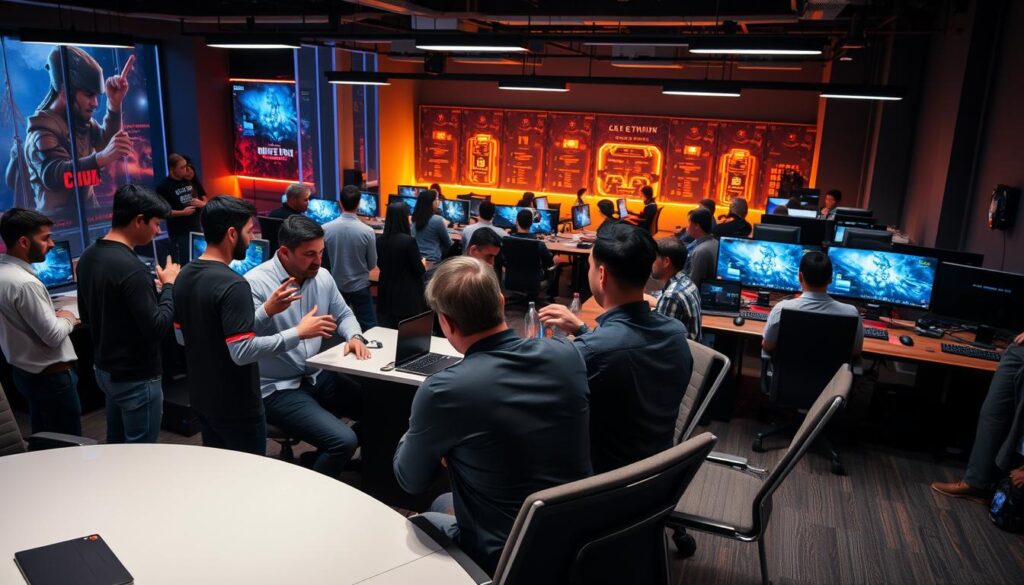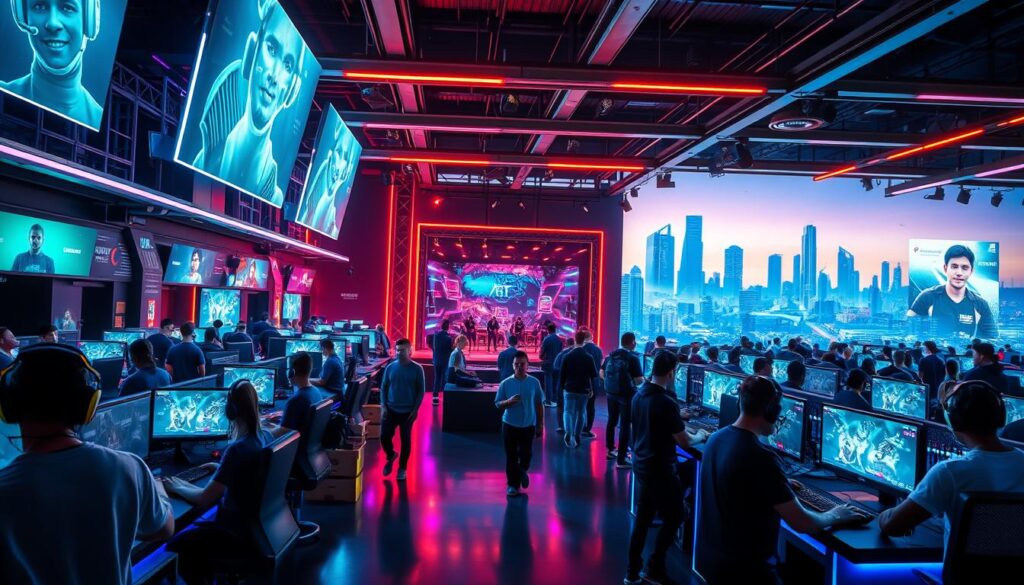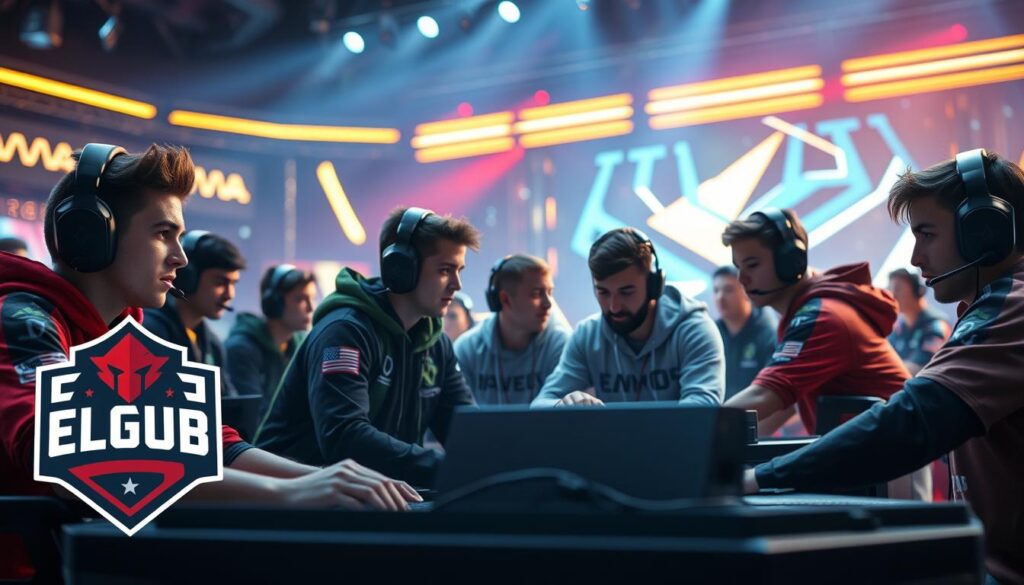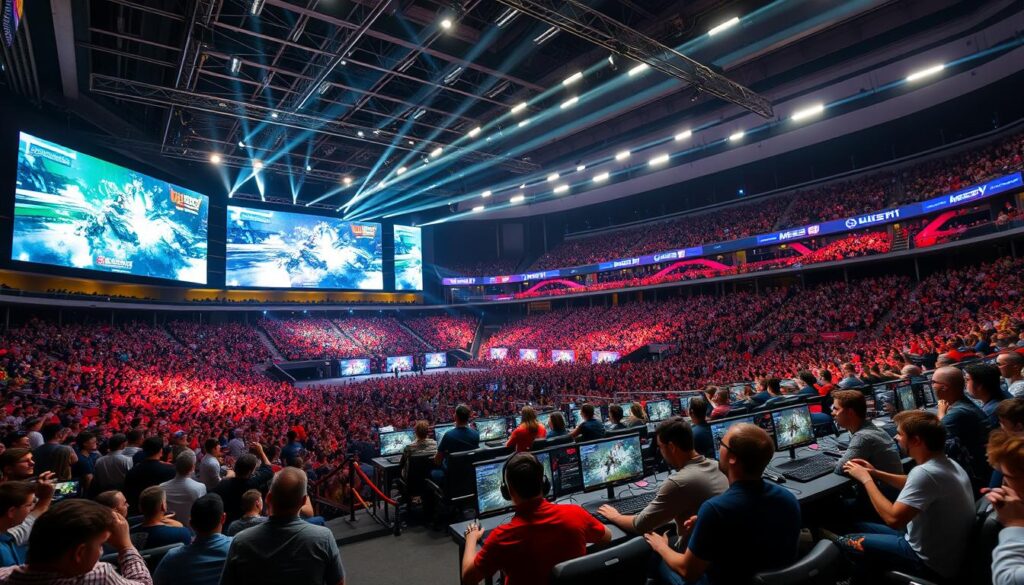Welcome to the digital arena, where quick reflexes meet strategic planning. This isn’t just a casual gaming session. It’s a $1.7 billion industry where top players sign big contracts. Before you dive in, let’s explore what professional gaming really requires.
The scene is like a chaotic MOBA game. Yes, there are stars winning tournaments. But they’re backed by coaches, content creators, and lawyers. It’s like Silicon Valley meets Madison Square Garden, with lots of energy drinks.
Surviving here needs more than just skill. Can you entertain viewers for hours after losing? Will your brand handle Twitter drama? It’s not just about getting better at games. It’s about navigating career paths.
This guide isn’t about seeking fame. It’s about seeing tournaments as business plans. It’s about turning Twitch chats into networking chances and knowing when to rest. The secret? It’s all about using spreadsheets.
Introduction: Not Just Pro Gamers
Esports isn’t just about gaming. It’s a world where esports management experts work hard to secure sponsorships. And esports casting pros turn games into exciting stories. This industry is worth $1.7 billion and needs many unsung heroes.
The esports job market is changing fast. Now, 60% of jobs are not about playing games. Here’s a look at some roles:
| Role Type | Sample Positions | Key Skills | Avg. Salary (US) |
|---|---|---|---|
| Management | Team Manager, Event Producer | Budgeting, Logistics | $62k |
| Casting | Play-by-Play Analyst, Color Commentator | Improvisation, Game Knowledge | $45k |
| Support | Data Analyst, Social Media Strategist | SEO, Community Engagement | $58k |
Esports managers are like the heroes of this world. They handle contracts and budgets. Casting pros need to be quick with words and know games well. “You don’t need aimbot-level reflexes to matter here,” said an Overwatch League producer. “Just the ability to make magic happen before the ‘ON AIR’ light blinks.”
In New Zealand, 38% of esports jobs went to people without gaming experience. The real stars are the ones who create stories and analyze data.
So, what role fits you? Are you good at organizing, making people laugh, or crunching numbers? The esports world is vast, and there’s a place for everyone.
Gaming and Non-Gaming Roles
Esports careers are more than just gaming. The industry is like an RPG party with different roles. You have your damage dealers, healers, and strategists. Let’s explore these hidden roles.
Player Positions
In-game roles are not just simple. Here’s a breakdown:
- Carry/ADC: The LeBron James of League of Legends, farming gold like Scrooge McDuck while teammates play bodyguard
- Support: Basically the team’s emotional support water bottle with map awareness
- Flex Players: Gaming’s Swiss Army knives, switching roles faster than Deadpool changes costumes
“A great support doesn’t just heal – they predict mistakes before they happen. It’s like playing chess while your teammates are playing checkers.”
Support Roles
Behind every pro player are non-gaming specialists:
| Role | Gaming Equivalent | Real-World Impact |
|---|---|---|
| Esports Coach | Dungeon Master | Turns raw skill into championship strategies |
| Data Analyst | Wizard Librarian | Translates 0s/1s into winning play patterns |
| Shoutcaster | Bard Class | Makes last-hit farming sound as exciting as a Marvel finale |
Modern esports coaching is a mix of strategy and data. Top coaches are like Thanos strategists, not just teaching headshots. They build team chemistry through VOD reviews and personality assessments.
Want proof this works? Championship teams have more support staff than players. It’s like the Avengers, but with more caffeine and fewer infinity stones.
Getting Noticed: Skills and Showcasing
In esports, your skills might be amazing, but a bad showcase can hide them. It’s like trying to get noticed in a crowd without standing out. Let’s explore how to make your pro gamer skills shine in a way that recruiters will remember.
Streaming like a pro starts with a top-notch setup. LeBron wouldn’t play in flip-flops, so why stream in low quality? Focus on:
- HD video quality (bad quality gets you roasted, not recruited)
- Strategic overlays that show sponsors without looking tacky
- Commentary that’s 30% hype, 70% analysis – like Shroud meets NPR
Esports casting is tough because your voice needs to be energetic yet clear. Aim for one pop culture reference per match, avoiding cringe-worthy catchphrases.
“Toxicity is the participation trophy of esports – everyone notices it, nobody wants it.”
Networking: It’s Not Just for LAN Parties
Building connections is more than just hanging out at LAN parties. Learn to network like you’re speedrunning (but fun). Pro tip: Ask insightful questions on Discord servers like you’re defending a PhD.
| Strategy | Win Condition | Fail State |
|---|---|---|
| Social Media Presence | Daily clips + industry commentary | Posting memes from 2016 |
| Tournament Participation | Regional qualifiers with commentary | Random Discord scrims |
| Brand Collabs | Authentic gear reviews | Promoting energy drinks like a lab rat |
In esports casting, being forgettable is your worst enemy. Find a unique style and stick to it. For players, every stream is an audition. That amazing 1v5 play won’t matter if it’s lost in a sea of other content.
Top Success Stories in Esports Careers

In esports, champions win by dominating virtual battles and entertaining fans on Twitch. Let’s look at three legends who built empires from gaming. They show us how to succeed in esports management through smart career strategies.
The Unkillable Demon King: Faker’s League of Legacy
Lee “Faker” Sang-hyeok changed League of Legends forever. He won 10 LCK championships and 4 Worlds titles. His $20M net worth comes from brand partnerships and tournament wins.
Faker’s success shows that esports management is more than just winning. It’s about becoming a cultural icon through sponsorships and collaborations.
“I don’t chase metas – I break them. Then sell the pieces as NFTs.”
SonicFox: The Fighting Game Messiah
When Mortal Kombat 11 came out, Dominique “SonicFox” McLean didn’t just play it. They turned their queer identity into a $500k/year brand. SonicFox’s secret? Using character select screens for marketing.
They also used LGBTQ+ advocacy sponsorships. This shows how personal branding can be more powerful than any combo.
Disguised Toast: From Among Us Imposter to Media Mogul
Jeremy “Disguised Toast” Wang made $8M from Among Us streams. While others played ranked queues, Toast created viral moments. He used custom mods, memes, and collaborations to win.
Toast’s story proves that esports management values entertainment over skill.
| Player | Key Game | Career Highlight | Management Factor |
|---|---|---|---|
| Faker | League of Legends | 4x World Champion | Brand Synergy |
| SonicFox | Mortal Kombat 11 | 11 EVO Titles | Identity Marketing |
| Disguised Toast | Among Us | 5M+ Subscribers | Content Engineering |
These stories are not fairytales but real-life lessons in strategic career development. Faker combined corporate partnerships with tournament wins. SonicFox turned marginalization into a marketable asset. Toast mastered algorithm psychology and content optimization.
They all show that esports management is the real goal.
Education & Training
Forget Harvard – the new Ivy League is all about headshots and APM rates. While old schools argue about esports, UC Irvine’s 64-seat gaming arena has been turning out pro players. They even get varsity jackets and scholarships.
Modern esports coaching mixes military discipline with Silicon Valley tech. It includes:
- Biometric tracking that’s way more advanced than Fitbit
- Reaction time drills that are as sharp as an F1 driver
- VOD review sessions that analyze gameplay frame-by-frame
“Today’s players need the strategic mind of Sun Tzu and the reflexes of an F1 driver – we build both.”
Now, you can major in League of Legends map control and minor in Twitch stream looks. Platforms like GamerSensei connect you with mentors who’ve won many virtual championships.
Here’s how esports training stacks up against traditional sports:
| Training Aspect | Traditional Sports | Esports |
|---|---|---|
| Daily Practice | 3-4 hours | 8-12 hours |
| Skill Metrics Tracked | 6-8 key stats | 40+ performance indicators |
| Career Peak Age | 28-32 | 16-24 |
Your mom said gaming wouldn’t pay the bills? Show her the $50,000 scholarships at University of Kentucky’s esports program. Then ask who’s laughing when you’re getting paid to master CS:GO smoke grenades.
The real education is in the grind. Top esports coaching uses AI tools to analyze tiny movements. Sometimes, victory depends on a 0.2-second difference in finger movement.
Networking in Esports
Networking in esports isn’t just about LinkedIn and coffee. It’s about winning a 1v5 match with your future boss watching. This world is all about digital rapport, built through gaming and chat, not office parties.

Big events like EVO and TwitchCon are like career speedruns. To get ahead, try these tips:
| Platform | Best For | Pro Tip |
|---|---|---|
| Twitch Chat | Organic connections | Ask smart questions during pro streams |
| Discord Servers | Niche communities | Share custom mods/strategies |
| Twitter Spaces | Industry debates | Debate meta changes intelligently |
| Event VR Lounges | Memorable impressions | Perfect your virtual handshake emote |
Your gaming behavior is more important than your resume. That time you called out a teammate? It might impress a future team manager. True story: A Valorant coach only hires from his ranked games.
“Your esports reputation spreads faster than a League of Legends surrender vote”
Looking for unique career paths? Check out our esports careers guide. It shows how shoutcasters and analysts got into the game through smart networking. Every ‘ggwp’ could be your chance to shine.
Tips for Aspiring Pros
To climb the esports ladder, you need more than just quick reflexes. It’s like being a chess grandmaster and a Dark Souls speedrunner at the same time. What sets pro gamers apart is their strategic thinking and endurance.
The Brutal Truth About Improvement
Don’t just follow the latest trends. Real growth comes from:
- VOD reviews that sting – watching your gameplay should feel like getting teabagged by reality
- Practice routines tighter than a fighting game combo – 30 minutes of focused drills beats 8 hours of autopilot
- Sleep schedules more consistent than your aim – your brain needs reset time like a server needs maintenance
“The difference between a pro and a pub star? Pros treat their bodies like gaming rigs – optimized hardware runs better.”
Science-Backed Performance Hacks
| Strategy | Impact | Time Investment |
|---|---|---|
| Cold showers post-practice | 23% faster reaction recovery | 2 minutes |
| Blue light blocking glasses | 17% reduction in decision fatigue | All gaming sessions |
| Hand-eye coordination drills | 41% accuracy improvement | 15 mins/day |
Here’s a secret: Improvement happens between matches. Analyze losses like a detective. Look at every micro-decision. Was that push timing right? Could you have positioned better?
Even esports legends started as noobs. The key is embracing the grind. It’s like facing the final boss of your origin story.
Conclusion
The final boss battle in esports isn’t on Summoner’s Rift or Dust II. It’s the voice that says “you can’t” when you start your first stream or apply for a job. Whether you’re playing ranked matches like Ninja or negotiating sponsorships like Riot Games’ Naz Aletaha, every journey starts with a choice. You can be a Pro gamer, analyst, coach, or one of the 237 Esports jobs listed by Hitmarker’s latest report.
This isn’t just fantasy – the Esports industry is worth $1.8 billion. It’s as real as NBA training camps. Casters like Lauren “Pansy” Scott show you can make a career out of play-by-play analysis, just like traditional sports broadcasting. The key is to approach your career like a speedrun. Optimize your education, network, and learn from mistakes quickly.
Your skills in spreadsheets could get you a job at FaZe Clan’s boardroom. Your experience in Discord moderation might lead to a role at Epic Games. The biggest mistake? Letting self-doubt stop you. Get ready with your mechanical keyboard or CRM software. Your career is waiting. What’s your next move?




